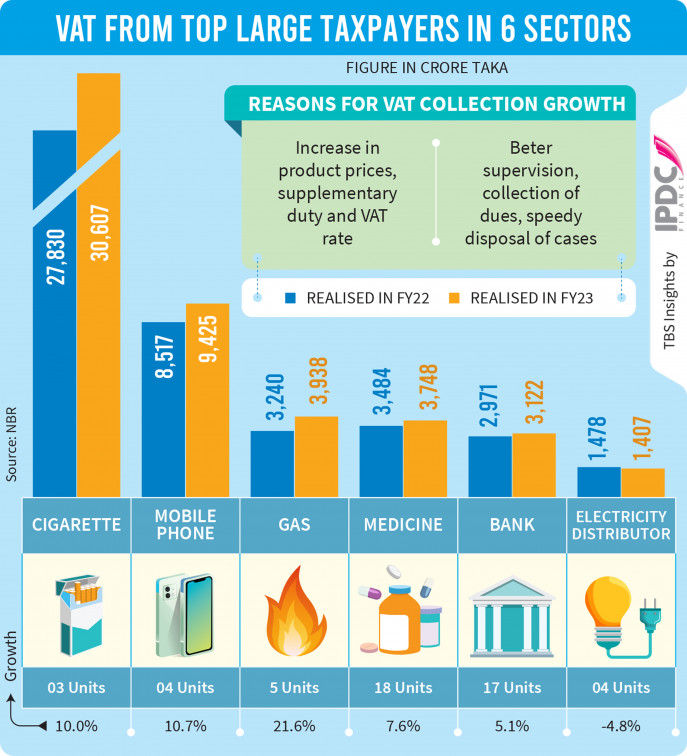
Despite a less-than-expected overall economic growth during the last financial year, 2022-23, the country witnessed a notable upswing in Value Added Tax (VAT) collection from big companies.
Stakeholders say the surge in commodity prices, particularly of import-dependent goods, bolstered the government’s VAT revenues.
Additionally, strategic measures such as elevating supplementary duty and VAT rates, as well as intensifying VAT officer supervision to curb evasion, expedite case settlements and collection of dues contributed to this relatively positive outcome, they said.
According to the National Board of Revenue (NBR), VAT collection in the large taxpayer units (LTU) office from the major companies amounted to Tk58,566 crore in FY23, marking a 12% growth compared to the previous fiscal year.
However, despite this significant increase in FY23, the collection still fell short of the financial year’s target by Tk7,500 crore.
The LTU-VAT office currently oversees the VAT payments of the companies that each account for Tk5 crore or more annually. A total of 110 companies from 37 different sectors currently fall under the purview of this office.
According to the NBR, the tobacco industry stands as the primary contributor to the VAT collection from large taxpayers units.
Three companies within the tobacco sector, spearheaded by British American Tobacco Bangladesh, account for over Tk30,000 crore, providing more than half of the total VAT collected from large taxpayer units in FY23, as per official data.
Additionally, VAT revenue has witnessed substantial growth in several other sectors due to gradual price increases in various products during the last financial year. Soap, beverage, cement, dairy products, biscuits, other food products, and edible oil have all contributed significantly to VAT collection.
According to NBR sources, the revenue of the LTU-VAT office witnessed a substantial increase of 241% from two companies in the edible oil sector, namely Shabnam Vegetable Oil Industries Limited and Bangladesh Edible Oil Limited.
Didar M Dabirul Islam, general manager of Bangladesh Edible Oil, said in FY23, the price of edible oil surged by over 50%. Additionally, the withdrawal of VAT exemption from March further contributed to a significant increase in VAT.
Speaking on the condition of anonymity, a high-ranking officer from a consumer goods company told The Business Standard that the NBR exerted pressure for tax and VAT through various means, eventually leading to the burden being passed on to consumers.
Meanwhile, the industrial gas sector experienced a remarkable 179% price hike in FY23, leading to a notable 22% increase in VAT collection.
The LTU-VAT office receives VAT payments from nine companies operating within the cement sector of the country. These companies collectively experienced a remarkable 29% growth in VAT contributions during the last financial year.
Masud Khan, advisor at Crown Cement, told The Business Standard, “Bangladesh relies on imports for clinker, the main cement raw material and other essential materials. Some of these imported raw materials are costly, and their prices have been further impacted by the devaluation of the taka against the dollar.”
“Consequently, the increased costs have led to higher prices in the cement sector, resulting in an overall boost in VAT collection,” he added.
He further said the larger companies have paid a greater amount of VAT compared to smaller ones.
“Smaller companies are facing challenges in opening a Letter of Credit (LC) due to the prevailing dollar crisis, which is not the case for the larger companies. As a result, the bigger companies have managed to conduct their business transactions more smoothly and make larger VAT payments compared to their smaller counterparts,” Masud Khan said.
Speaking on the condition of anonymity, an official from the LTU-VAT office told TBS that one of the primary reasons for the NBR failing to meet VAT collection targets is the issue of overzealous targeting. According to the official, the set targets are unrealistically high, leading to difficulties in achieving them.
Banks-insurances lag behind
Although certain sectors have shown promising performance, the banking sector witnessed a modest growth of 5% in VAT during FY23. Conversely, VAT collection from six insurance companies declined by 4.5% compared to the previous fiscal year.
Insiders within these sectors attribute the slower growth and decline in VAT collection to the overall economic slowdown, which has impacted the expected income within the industry.
Syed Mahbubur Rahman, managing director and chief executive officer of Mutual Trust Bank Limited, said the overall business in the banking sector experienced a slowdown. This decline in business, coupled with a reduction in imports, led to a shortfall in the expected VAT collection from the banking sector.
Regarding the VAT collection decline from the insurance companies, he said marine insurance has seen a decrease. Additionally, certain segments of the transport sector have been exempted from insurance.
Negative growth in VAT collection in five sectors
In the previous financial year, several sectors experienced negative growth in VAT collection, including insurance, electricity distributors, oxygen, telecom equipment, and advertising firms.
NBR officials said the reduction in the number of power projects under the Rural Electrification Board (REB) and the decrease in payments to contractors have contributed to the decline in VAT collection from electricity distributors.
As for the oxygen sector, Linde BD faced challenges in competing with local companies, resulting in a decline in its performance and subsequently leading to lower VAT collection from this industry.
Growth less likely in FY24
Stakeholders in various sectors believe that the anticipated growth in the business activities of major companies for the current FY24 is less likely to materialise due to the continuous economic slowdown and the prevailing political uncertainty in the country.
Shahed Alam, chief corporate and regulatory officer at Robi Axiata Limited, said, “If inflation rises, people tend to reduce their spending, directly affecting the income of mobile operators.”
The lack of political stability creates challenges in implementing new initiatives and roll-outs, further impacting the industry’s growth prospects, he added.

